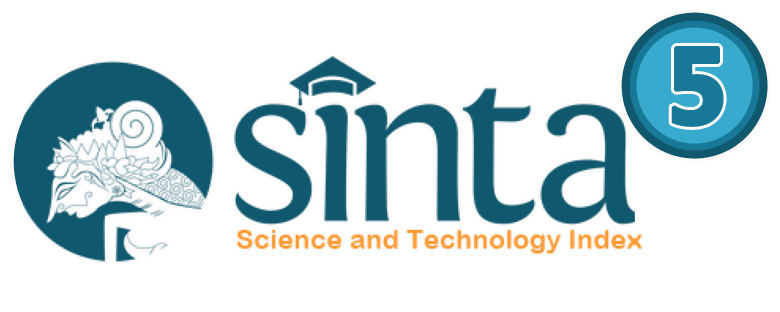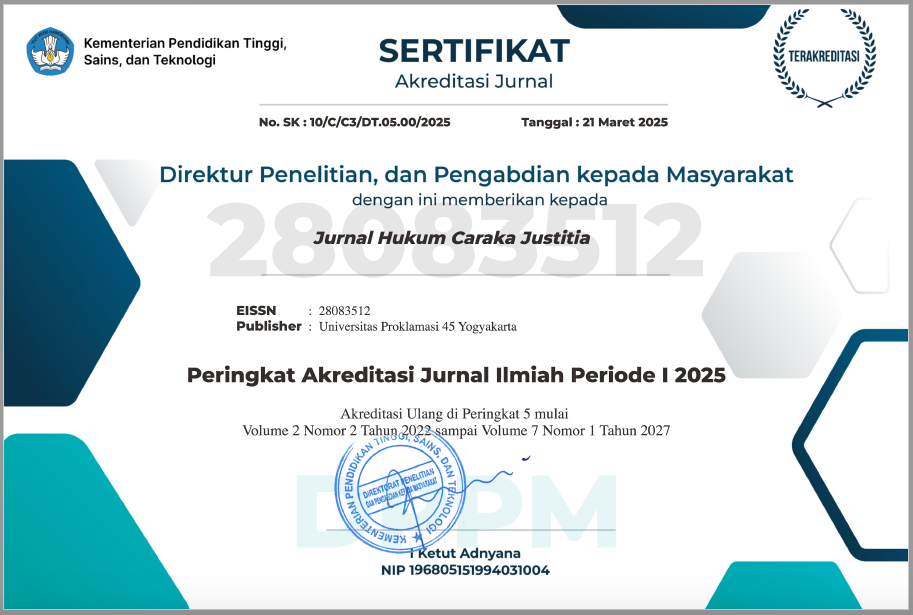Tinjauan Yuridis Terhadap Tindakan Euthanasia dalam Perspektif Interkonektif
DOI:
https://doi.org/10.30588/jhcj.v1i2.922Keywords:
Juridical Overview, Euthanasia, Interconnective PerspectiveAbstract
The purpose of this study is to examine and determine the application of the law to the act of euthanasia in the perspective of the interconnectedness of Islamic law and Indonesian positive law. The research method used in this study is a normative juridical approach. This approach is intended to be a type of dogmatic research (doctrinal) and a form of prescriptive research in relation to laws. Furthermore, the research specifications are descriptive analytical, namely by describing the problems raised and providing analysis of the problems so as to be able to provide answers to these problems.
The thesis statement of this research is that euthanasia in principle in all legal perspectives in Indonesia is an act that is prohibited, in the Criminal Code, namely passive euthanasia and active euthanasia. So that euthanasia is an act that cannot be implemented or has not been legalized because it is contrary to the Criminal Code, although the application of this article is felt to be very difficult in terms of proving it.
In Islamic law, euthanasia is prohibited because life and death are the absolute right of Allah SWT and humans to always be ordered to maintain their lives with their endeavors when healthy or sick. Euthanasia, or killing without suffering until now has not been accepted in the values and norms that developed in society because it is not in accordance with the ethics adopted by the Indonesian people.
References
Buku
Anwar, Syamsul. Interkoneksi Studi Hadits dan Astronomi. Yogyakarta: Suara Muhammadiyah, 2011.
Bertens, K. Sketsa-sketsa Moral: 50 Esai tentang Masalah Aktual. Yogyakarta: Kanisius, 1994.
Bertens, K. Perspektif Etika: Esai-Esai Tentang Masalah Aktual. Yogyakarta: Kanisius, 2001.
C., Seper Fr., & Hamer J. The Pope Speaks: The Church Document Quarterly Vol. 25, no. 4; Euthanasia: Declaration of the Sacred Congregation for the Doctrine of the Faith. Huntington: Our Sunday Visitor, 1980.
Ebrahim, Mohsin Abdul F. Telaah Fiqh dan Biotika Islam. Jakarta: Serambi Ilmu Semesta, 2001.
Fajar, Mukti, & Yulianto Achmad. Dualisme Penelitian Hukum. Yogyakarta: Fakultas Hukum Universitas Muhammadiyah, 2007.
Go, Piet. Euthanasia: Beberapa Soal Etis Akhir Hidup menurut Gereja Katolik. Malang: Dioma, 1989.
Hermanto, Agus, & Bunyamin, Mahmudin. Fiqh Kesehatan Permasalahan Aktual dan Kontemporer. Bandung: Pustaka Setia, 2016.
Lamintang, Theo, & Lamintang. Kejahatan Melanggar Norma Kesusilaan dan Norma Kepatutan. Jakarta: PT Sinar Grafika, 2009.
Setiardja, Gunawan. Dialetika Hukum dan Moral dalam Pembangunan Masyarakat Indonesia. Yogyakarta: Kanisus. 1990.
Soekanto, Soerjono. Pengantar Penelitian Hukum. Jakarta: UI-Pres, 2007.
Sumaryono, E. Etika dan Hukum Relevansi Teori Hukum Kodrat Thomas Aquinas. Yogyakarta: Kanisius, 2002.
Suprapti, Ratna Samil. Etika Kedokteran Indonesia. Jakarta: Fakultas Kedokteran Universitas Indonesia. 1994.
Susanti, Dyah, O. & Efendi Aan. Penelitian Hukum (Legal Research). Jakarta: Sinar Grafika, 2015.
Tjahjadi, Lili SP. Hukum dan Moral Ajaran Immanuel Kant tentang Etika dan Imperatif Kategoris. Yogyakarta: Kanisius, 1991.
Triwibowo, Cecep. Etika dan Hukum Kesehatan. Yogyakarta: Nuha Medica, 2014.
Internet
Dhivira, Riana. “Euthanasia : Dilema Antara Moral, Hak Hidup, dan Hukum”. https://rianadhivira.wordpress.com/2012/11/12/euthanasia-dilema-antara-moral-hak-hidup-dan-hukum/ (diakses 3 November 2021).
Gresnews.com. “Legalisasi Euthanasia di Indonesia”. http://www.gresnews.com/berita/tips/734182-legalisasi-euthanasia-di-indonesia/0/ (diakses 3 November 2021).
Grezzdietyn.blogspot.com. “Euthanasia”. http://grezzdietyn.blogspot.com/2012/10/ euthanasia.html (diakses 3 November 2021).
Harianti, Fuji Rahma. “Makalah Aborsi; Euthanasia; Bayi Tabung”. http://sahabat-rianti.blogspot.co.id/2014/05/makalah-aborsi-euthanasia-bayitabung.html (diakses 29 Oktober 2021).
Ilma, Fera. “Aborsi Dalam Tinjauan Etika Hukum Positif dan Hukum Islam”. http://www.slideshare.net/ferailma/aborsi-dalam-tinjauan-etika-hukum-positif-dan hukum islam (diakses 3 November 2021).
Purnama, Rabdhan. “Euthanasia Ditinjau dari Aspek Hukum”. http://rabdhanpurnama.blogspot.co.id/2012/07/euthanasia-ditinjau-dari-aspek hukum.html (diakses 3 November 2021).
Rahmat, Wilta Aulia. “Hukum Euthanasia Menurut Islam”. http://aul-al-ghifary.blogspot.com/2013/10/hukum-euthanasia-menurut-islam.html (diakses 1 November 2021).
Solusi Hukum. http://www.solusihukum.com/kasus2.php (diakses 29 Oktober 2021).
Downloads
Published
How to Cite
Issue
Section
License
Copyright (c) 2021 Sigit Wibowo

This work is licensed under a Creative Commons Attribution 4.0 International License.
Authors who publish with JHCJ agree to the following terms:
Authors retain copyright and grant the JHCJ right of first publication with the work simultaneously licensed under a Creative Commons Attribution 4.0 International License that allows others to share (copy and redistribute the material in any medium or format) and adapt (remix, transform, and build upon the material) the work for any purpose, even commercially with an acknowledgment of the work's authorship and initial publication in JHCJ.
Authors are able to enter into separate, additional contractual arrangements for the non-exclusive distribution of the journal's published version of the work (e.g., post it to an institutional repository or publish it in a book), with an acknowledgment of its initial publication in JHCJ. Authors are permitted and encouraged to post their work online (e.g., in institutional repositories or on their website) prior to and during the submission process, as it can lead to productive exchanges, as well as earlier and greater citation of published work (See The Effect of Open Access).














